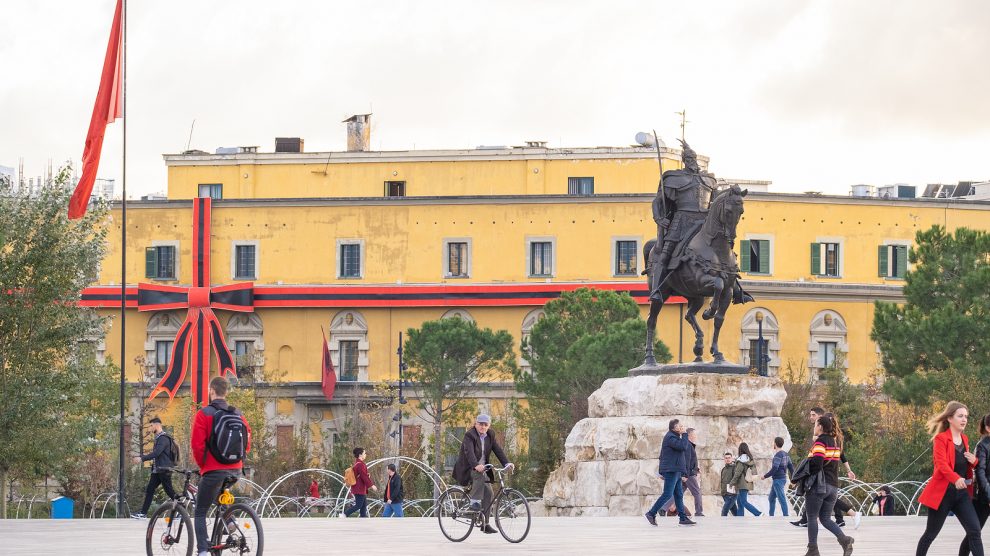For Albania’s share of employment in high-skilled occupations to reach the Western Balkans average, more than 100,000 people (nine per cent of the workforce) need to transfer from low- and medium skilled jobs to high-skilled jobs.
Albania’s economic model requires greater investment in people’s skills, firm productivity, sustainability, and public finances, according to a new report from the World Bank.
- Less carrot, more stick: EU support for Western Balkans ‘insufficient’, say auditors
- Albania, North Macedonia, Serbia push ahead with Open Balkans
- EU enlargement is not just about democratic values and the rule of law. There’s the economy to think about too
The new World Bank Country Economic Memorandum (CEM) for Albania, published last week, says that the country has been severely impacted by the economic shocks which followed both an earthquake in 2019 and the Covid-19 pandemic.
It says that once the ongoing health crisis subsides, the country will need to refocus on its long-term economic objectives, which include building a strong and sustainable growth model to improve citizens’ living standards, thereby helping incentivise people with skills and talent to remain in Albania.
Albania’s working-age population continues to shrink as people emigrate in search of better job opportunities. The Albanian diaspora represents 57 per cent of the country’s current population, one of the highest in the world.
While Albania’s population of 2.8 million in 2020 has remained constant since the early 1980s, it has aged rapidly due to the continuous emigration of working-age Albanians and a decline in the fertility rate, from 3.4 in 1980 to an average of 1.62 in 2015–20.
“Through this report, we conduct a fresh analysis of Albania’s development challenges, summarise progress with reform implementation, and offer key recommendations that can help Albania achieve a sustainable, resilient and inclusive economic recovery,” says Emanuel Salinas, World Bank country manager for Albania. “In our recommendations we also focus on what needs to be done to enable the Albanian people to have healthy and productive lives and more and better jobs.”
Four key priorities
The report discusses four development priorities to strengthen the Albanian economy.
The first of these is investing in people and upskilling. The report says that to address the skills gap, Albania needs to shift its workforce from low- and medium-skilled jobs to high-skilled ones, but acknowledges that this a huge challenge.
For example, for Albania’s share of employment in high-skilled occupations to reach the average of the Western Balkans, 111,000 workers (nine per cent of the workforce) would need to transfer from low- and medium skilled jobs to high-skilled jobs.
This, the report suggests, requires improving the learning process, reforming the university system, and better matching skills development to labour market needs.
Second is increasing firm productivity and creating better job opportunities. GDP per person employed in Albania would increase by 40 per cent if Albanian businesses had the same level of productivity as the average Western Balkan firm. For Albanian firms to be more productive, the business environment must be improved, innovation must be strengthened, and integration of Albanians into the global economy must be deepened.
Thirdly, building a more sustainable growth model. More than 70 per cent of Albania’s waste is mismanaged, while earthquakes and floods cause damage costing 147 million US dollars each year, on average. The reports says that Albania needs to build an economic model that is environmentally conscious, and more resistant to natural disasters.
The fourth priority if strengthening public finances. Albania’s public debt is well above the average of the six Western Balkan countries. To ensure the sustainability of the country’s finances, personal income tax rates should be fairer, VAT revenues increased, and fiscal policy credibility reinforced, particularly through a sustained political commitment to fiscal rules.
Unlike many news and information platforms, Emerging Europe is free to read, and always will be. There is no paywall here. We are independent, not affiliated with nor representing any political party or business organisation. We want the very best for emerging Europe, nothing more, nothing less. Your support will help us continue to spread the word about this amazing region.
You can contribute here. Thank you.



